
Blogger outreach, if done well, can be an effective way to get quality backlinks to your site. But here’s the catch. Not everyone knows about the tremendous hard work that is required to make their efforts pay off.
But don’t worry. We are here to guide you through the entire process. Read on to find out about what blogger outreach is, the different types of blogger outreach, and how to execute every step perfectly.

Until 2010 or so, you probably got a lot of emails asking you to exchange links to similar websites. That trend died down, although there are still a few doing it. A lot of things changed with the growing popularity of social media. People stopped exchanging links as much and focused on social media instead. Some unethical practices like buying followers ensued, too. You probably still hear of them from time to time.
Such practices became more and more obvious as time went by and got noticed by search engines too. As the influence of such social media marketing declined, the need to diversify brands’ social media presence became more important. Hence emerged blogger outreach campaigns.
In blogger outreach campaigns, companies reach out to a blogger or influencer who posts things relevant to their target market and has a large following. The companies ask bloggers to write and post about their products. What do the bloggers get out of it? Free, authentic products or services, provided by the companies themselves. Sometimes they get additional monetary payments too, depending on the contract.
But why would you, as a company, just give away your stuff for free? This is because unless your products are really bad (in which case, you have bigger things to worry about), bloggers aren’t likely to bash your products in a review. We are not saying that they would rate your product or service 10/10 just because they received it for free. But, they are less likely to harshly nit-pick at every flaw. The bloggers too would want to maintain the relationship that has just started blossoming with your company.
And if they like your products, well, jackpot! You will probably get a glowing review written about your company. So, if you know that you are offering a great product or service, blogger outreach can be a great way for you to get more organic and relevant traffic to your website that can convert into higher sales!
However- and this applies especially if you are paying the blogger or influencer money- forcing them to include a do-follow link, through a contract, is not a wise idea. Google might consider it a link scheme, and your website can get penalized. This can adversely affect your rankings. So, rather than gain in organic traffic and sales, you might lose the results of months or years of effort in SEO, and the money you invested in the blogger too!
Fortunately, there are different types of blogger outreach strategies you can use. Why is this a good thing? Not all types of strategies are appropriate for all businesses. Some might find guest posts more beneficial for them, some interviews, and some others might find roundup posts more to their liking.
So, what are some of the different strategies of blogger outreach?
Also known as “guest blogging”, guest posting means writing content for someone else’s website. Bloggers usually guest-post for websites that are similar to theirs or in the same industry to attract a relevant audience to their own website. So, you first found out which websites in your industry accept guest posts, see what kind of content they produce, and then email a pitch to write for them. If it works out, you will have an opportunity to reach their audience and hence improve your brand visibility.
You reach out to a blogger who does product reviews. That is, if you have seen someone post reviews of products that are similar to yours in the past and get good responses for it, you can ask them to review a product of yours. You can offer the product to them for free, or pay them a fee for the review, whichever is appropriate.
If you find broken links on pages on well-known sites that you want to get links from, reach out to them. You can use the free Google Chrome extension called Check My Links to locate broken links across a page. If the sites respond to you, offer them a link from your website to replace those broken links. It goes without saying that you should offer links to content that will add value to that page or are similar to the link that they previously included on their site. As you will be offering them value first, and then asking for a link, you have a higher chance of successfully building a relationship and thus, getting a link.
If you have produced content that you think will be helpful for the audience of certain prospects, you can share it with them. If they like it, they will share it with their audience. Make sure to share the link with only those bloggers who already share links to similar content.
You can reach out to the authors of blogs that your content can add value to through email. Make sure to not sound pushy. If they find your content suitable, they will link to it. Pestering them won’t do you any good. If you want to know more about link-building strategies, click here.
You can reach out to popular bloggers for an interview for your blog. If all goes well, they might link to and share your piece after it is published, thus getting you lots of quality referral traffic! Alternatively, you can ask them to come as a guest on your podcast or webinar. Interviews and podcasts are good ways to get high amounts of quality traffic for both you and the blogger, as you can learn from here.
There are different kinds of partnerships, and so your approach will differ based on the type you are looking for. When reaching out to them, clarify the kind of partnership you are seeking.
You need to keep in mind certain factors before engaging in blogger outreach. Blindly choosing tons of prospects will result in too much pain for too little gain. You need to narrow your list of prospects down. Ask yourself these questions before finalizing your list to significantly improve your chances of success and increase the return you will get from your investment in blogger outreach!
What kind of content does the site usually produce? Are more of their articles detailed and precise guides? Or do they produce listicles a lot? And obviously, are their content relevant to your niche? If not, cross them off from the start.
What level of audience do they target - beginners, intermediate, or professionals? Does their target group match with yours? Are their audience consumers or businesses? If your products are for consumer consumption, you probably don’t want to reach out to someone whose audience mostly comprises businesses. If the site has an active newsletter, how many subscribers do they have?
How much attention do the guest posts on the site receive? Does the blog owner share them? Check the number of likes, comments, and shares. If the guest posts do not receive much attention when compared to the posts by the owner, they aren’t likely to result in high referral traffic to your website.
Moreover, how strict are their guest posting guidelines? It is usually a good sign if they have strict guidelines.
Furthermore, who are the other guest bloggers who have written on this site in the past? Are they other bloggers, business owners, or consultants? Knowing this can help shape your pitch to the blog owner. Some blog owners work mostly with certain types of guest bloggers, and if you fit that type, your pitch is likely to get accepted.
When was the last time that the site’s blogs were updated? Is the website frequently updated? Do their posts get real, meaningful comments?
Besides, what is the domain authority (DA) of the website? You can choose to have a benchmark. For example, you could decide that you want to reach out to only those websites that have a domain authority of over 30. Also, look into their link profile. Do they have backlinks from high-quality websites? Check how diverse their anchor text is. To check these and more metrics of the backlinks of a site, you can use BacklinkSEO. You can even access much of the information for free!
How many guest posts are there on the website, compared to posts by the blog owner? Except for blogs that are very interactive and driven by their community, a blog that is filled with guest posts and has just a few posts written by the blog owner should not be on your prospects list.
Also, look into how active they are on social media. How engaged in their posts are their audience? Does their audience share their content? How many genuine followers do they have?
You can maintain an Excel file to keep track of all these factors for each website that you have gone through. This will keep things neat and organized. You can also add columns showing if you have reached out to them yet and if they have gotten back to you.
Phew! You’re now done with a crucial part of blogger outreach.
Prospecting is a vital step in blogger outreach, so make sure that you sufficiently prepare for it. Even if you hold high standards for your prospects and produce amazing content, you will get little to no return if you work with the wrong type of sites.
So, how do you find good prospects? Read on to find out!
You can use different types of advanced search queries on Google to find more useful results. This is different than how a regular user would search for queries. Follow our advice to deliver more relevant results.
Follow this format to find specific words in particular blog sites.
keyword/keyphrase URL:blog
For example: link backlinkseo.com: blog
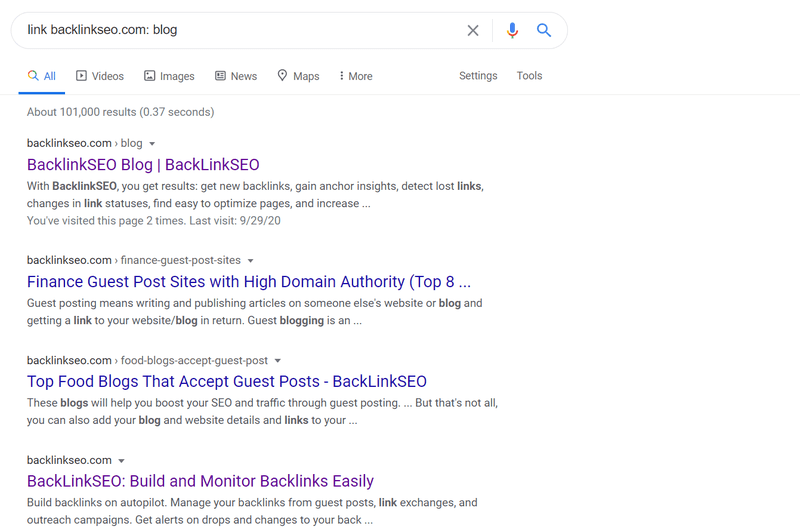
You can use this to filter the results with the exact word or phrase you are looking for. This is especially useful during the initial stages of your blogger outreach efforts. Although many people still use this format, it’s not as popular as it used to be.
Here are some formats you can use.
Here is a screenshot of the results of the format provided in the first point.
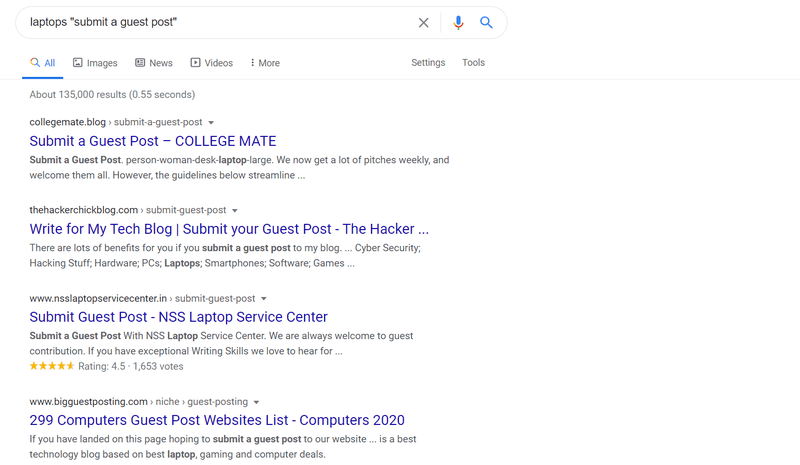
Want to hear some good news? You don’t have to do all this alone. BacklinkSEO can actually take care of this for you as a part of its automated outreach campaign. Simply start an outreach campaign, type in a keyword, and get the results you need!
Phew! That is a weight off your shoulders, isn’t it?
You can find results that have the exact keyword or keyphrase you mentioned in their title.
Keyword/keyphrase Intitle:Guest Post
For example: Computers Intitle:Guest Post
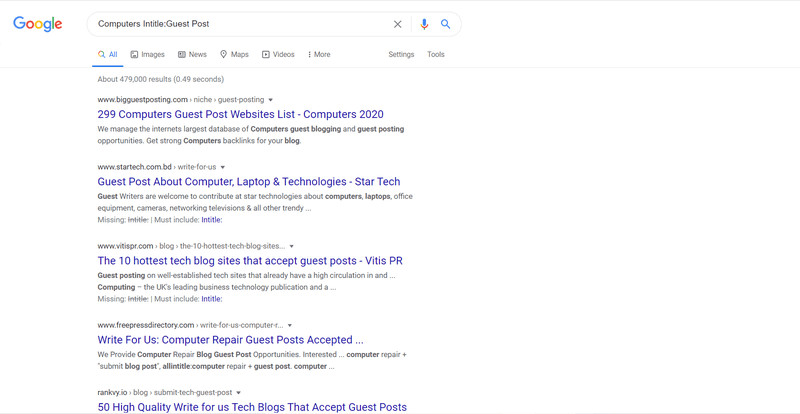
As you can see, we found tons of blogs that talk about computers and accept guest posts using this search query. You can use this format to find other things too, such as advertising information, tutorials, resources, and more.
Using the wildcard search operator (*), you can find results that have certain exact words within your query and an extra word in place of the wildcard.
Keyword/keyphrase “Guest*” inurl:blog
For example: health “Guest *” inurl:blog
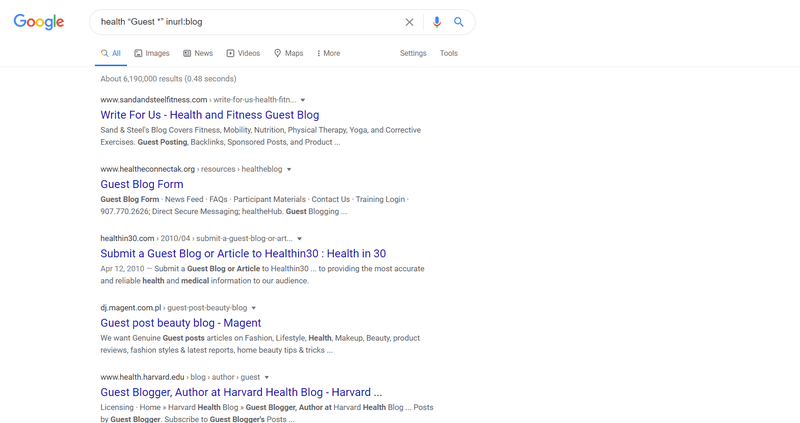
This query will return blogs on health that contain “Guest” in their title or content, with an extra word in place of the wildcard, such as “Guest Blog” or “Guest post”.
If you want to find out where your competitors are building links from, you can use tools like Google Alerts.
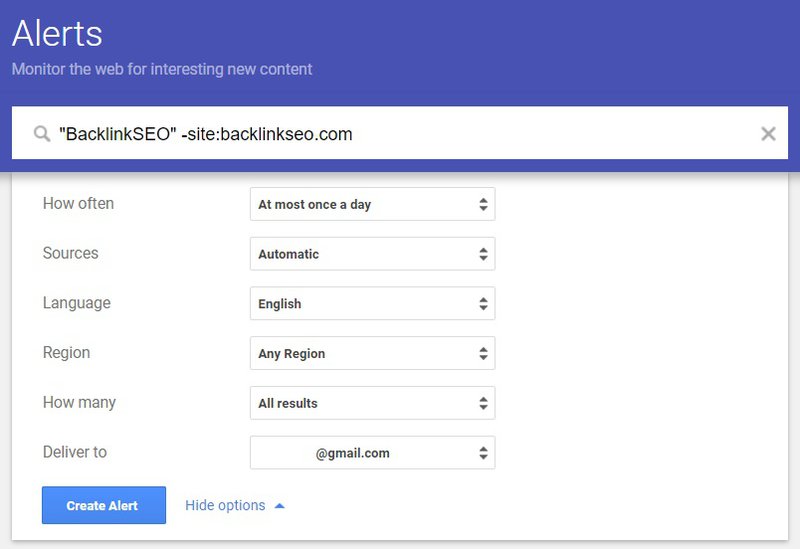
You can alter the frequency of the notifications and specify if you want to see all results or only the best ones.
Why did we write “-site:backlinkseo.com” though? Using this (-) sign allows us to exclude mentions from certain sites. Since BacklinkSEO will obviously be continually mentioned on its own site, getting alerts from backlinkseo.com does not really add value.
You may also use Mention for getting alerts. They offer 1 alert per month for free. You can check their prices for more alerts here.
You can use tools like BacklinkSEO to conduct a backlink analysis of your competitors’ websites. If you go through their backlinks, you will be able to locate any blogs they have guest posted for or any other such particular affiliations you want to find out.
The first step to this technique is to leave breadcrumbs- that is, posting content on websites that have high domain authority. An example would be Business2Community. They will review your content before publishing, obviously, to maintain high standards of quality. You can also check where bloggers share content from and see if they are accepting contributions.
Posting on such highly authoritative websites will mean people will share the piece without you even needing to ask them to. And who knows? Maybe some popular influencer will share it too!
Next, visit https://twitter.com/explore and search for the exact title of your piece. You will be able to see a list of everyone who has shared it. Now, you can go through the names and choose some prospects to reach out to. Thank them, and politely ask if you can write on their blogs someday. If they are interested, which they are likely to be since they have already seen your work and liked it enough to share it on social media, they will respond positively and you can land a guest posting opportunity. Hence, you can get a list of prospects through Twitter shares.
And you know the best part about finding prospects through Twitter? The results are all real-time. So, you can reach out to the prospects who are likely interested in a certain type of content right now.
Keep in mind that sites like Business2Community sometimes even have content partnerships with websites like Yahoo!, Mashable, and Forbes. Note the type of content these big websites like Mashable usually produce from these sites. Try to produce something similar. Emailing such big sites rarely work, so writing on sites they have content partnerships with is a good way to possibly get high-quality links.
You already know who the well known and innovative guest bloggers in your industry. Search their name and add this: “guest post by” or “guest blog by”. The search results should show you a list of websites that guest bloggers have written on. Hence, you can see if they are accepting contributions and reach out to them.
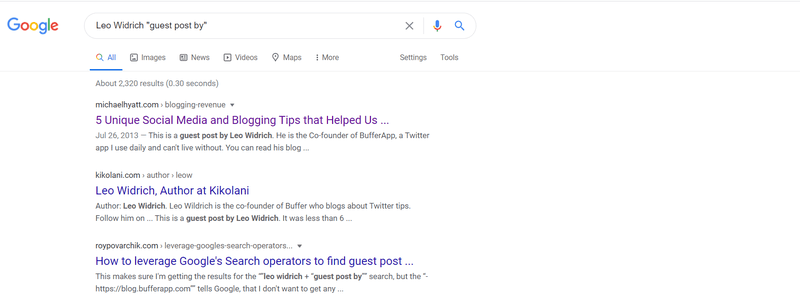
Tip - if you know a guest blogger in your industry, you can use that to your advantage by asking them to introduce you to a blog owner they have guest posted for.
There are many articles that list different sites and talk about their products or services. Search for ones that talk about your competitors and similar businesses. Check the DA and other important metrics of the websites. If they match your standards, you can contact them and ask to mention your website.
Examples of such search queries: Top 15 health blogs and List of Fitness Blogs.
Other than Twitter, there are some good websites you can use to find bloggers too. We talked about how to find bloggers using Twitter in the section “The Breadcrumb Trail Technique”.
Followerwonk focuses on Twitter and helps you search through Twitter bios to spot prospects for blogger outreach. You can use this tool to target new bloggers, too.
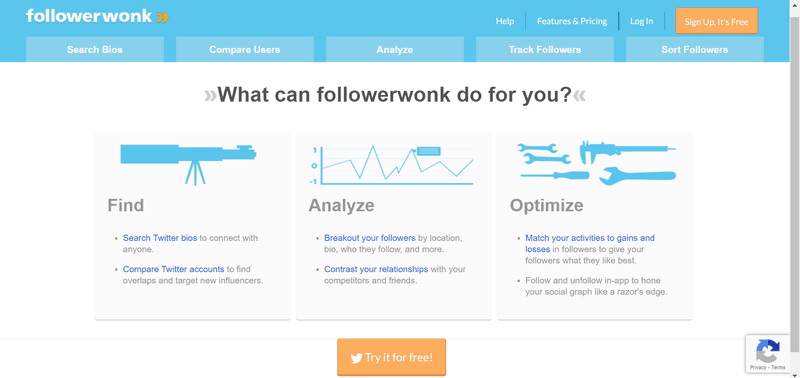
BuzzSumo can help you find top content and popular bloggers in your industry related to the keywords you search for.
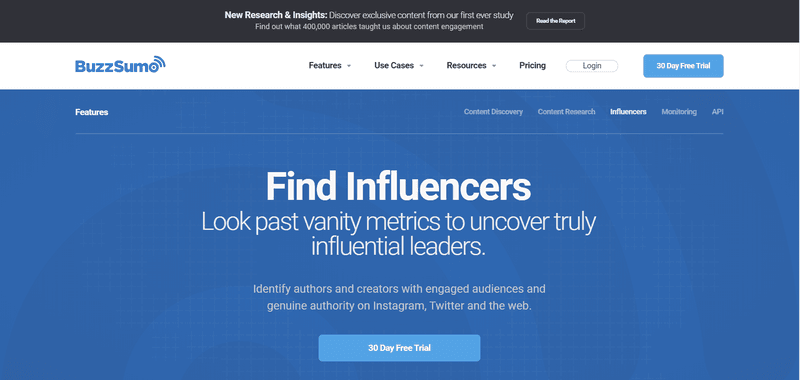
You can also filter content by type here (articles, infographics, interviews, videos, guest posts, etc.). BuzzSumo will also allow you to view metrics about the influencers’ engagement and see the content that the influencers share.
We are finishing this section with a simple strategy. If you have featured some blogger or site in your article, reach out to them. If they like your piece, they will share it and link to it too. Thus, include such entities in your list of prospects to reach out to.
If you need assistance in this, BacklinkSEO’s Outreach campaign can help you.
Now that you are done finalizing your list of prospects, it is time to reach out to them.
Here’s the thing. You can probably find tons of email templates if you search for them on Google, each one claiming to be more successful and clever than the last. While we have nothing against email templates, we are here to tell you that you should not rely fully on them.
Even if you are using a template, use it as a starting point. You need to personalize your email keeping in mind the blogger you are reaching out to and write it such that it increases your chances of building a relationship. If you send generic templates out to everyone, well, that is what they’ll end up looking like - generic templates that you probably send out to everyone. And this may make the bloggers feel like they are not being valued. They get tons of emails every day. So, your email needs to stand out. Also, keep in mind that you are communicating with a human being. Seeking psychological tricks or using manipulative tactics will result in little gain if any at all.
Firstly, do not use all caps on the subject of your email. Study the blogger before reaching out. What kind of content do they produce? For example, if you are selling organic skincare products, do not just reach out to any blogger who has reviewed some type of skincare products in the past five or six times. Find one who frequently talks about using organic skincare products. Show them that you have genuinely seen their content.
State your purpose of reaching out. Tell them about the benefit they will receive from your proposition politely.
Also, if you want to praise the recipient, tell them about something specific you like about their content or website. For example, “What you said about X was really inspiring. I am going to implement it myself.” They receive tons of emails with generic and shallow flattering words every day, so this is a way to stand out.
When closing the email, include a call-to-action. We don’t mean directly asking, “Can I get a link, please?” It usually isn’t appropriate to ask for backlinks in the very first email. Rather, you can include questions like, “What do you think about this?” This is quite a generic example, so feel free to go with one that seems the most appropriate for the context. And do include your email signature that specifies your name, job title, company name, and logo at the end. This adds a sense of credibility.
Remember that the more well-known you are, the higher the chances of getting your desired response. Also, following them on their public social media profiles, reacting to and commenting on their blog posts before sending them an email can also help your case. Doing these will signal to them that you have actually followed their work and appreciated it. Of course, do them in moderate amounts so that it appears natural. Suddenly commenting on 10 of their posts dating back to 4 months ago might not make them feel very appreciated.
We will now show you a few templates that you should definitely customize before reaching out to someone through email. Use this as an initial draft and add appropriate details.
Hi [recipient’s first name],
My name is [insert your name] and I run [insert your blog], where I write about [topic names].
I am writing to you because I would love to contribute a guest post to your website [insert URL]. It seems like your readers love your pieces on [insert topics] and so I was thinking of writing on [insert the topics you want to write on without going into a lot of details].
If you would like to see some of my work, I have already written for these blogs: [insert URL to some of your relevant, best pieces].
Let me know what you think about this.
Regards,
[Your name and email signature]
Hello [first name of the recipient],
I just came across your piece on [topic/title and link to that page] and loved it! I especially liked [insert a short and specific detail you liked, if possible].
However, I noticed that a few of the links do not work anymore.
These websites seem to have closed down.
[insert the broken links]
I have written a piece on the topic that can work as a replacement, in case you are interested.
[link to your article]
I sincerely hope that this helps. If you need anything else from me, please let me know. Thanks.
Best,
[Your name and email signature]
If you are reaching out to the author of a listicle you would like to add your website or article’s link to, see the template below.
Hi [first name of the recipient],
I recently came across your article on [topic/title of listicle] while browsing through content on the topic.
I have actually written a piece on [insert the title of your article]. Here is the link to it: [insert URL].
I thought it will be a good addition to your article.
Anyway, I hope that you like my piece. Have a good day!
Regards,
[Your name and signature].
Remember to engage in blogger outreach for only your best pieces. If you do it for all of your pieces, you might end up annoying people and burning more bridges than you will build.
According to Ahrefs, most replies and links come from follow-ups.
Does that mean you should send 20 follow-ups in a row if you don’t get a reply to your first email? Absolutely not.
Follow-up a maximum of one time. If you keep sending people emails, not only will they get annoyed, but you will also not be able to build a relationship with them.
A short and simple email like the one below will do fine.
Hi [recipient’s first name],
This is a quick follow-up to my last email, just in case you have missed it.
If you are busy, I totally understand. I won’t take up more of your time.
Thanks!
[Your name and signature]
In addition, you can use email tracking tools like Yesware. Such tools can let you know when your email was opened and remind you when to follow up.
Keep records of your blogger outreach activity. Not only will it help you keep track of what has been done so far, but it will also help avoid accidentally emailing the same blogger for the same purpose over and over again. A simple Excel spreadsheet can help you with this.
Also, make sure that you use people’s names when greeting them, and not general titles like “blog manager”.
If you are seeking a guest posting opportunity, don’t forget to talk briefly about the post you would like to contribute. Also, before choosing the topic, check their past content to see if they have produced content on that topic. If they have, don’t pitch the same topic again.
Lastly, do study up on the people or sites you are reaching out to. We know that it’s a lot of hard work. But it still gives you higher chances of successfully building a worthwhile connection, compared to just mass emailing tons of sites a generic template.
Outreach takes a lot of hustle and patience. If you do not have the budget to spend on blogger outreach and are working only on your website or that of a few clients, you can just follow all the tips and tricks given in this article and do the outreach yourself. We probably sound like a broken record by now, but maintain an Excel spreadsheet to keep things organized.
On the other hand, if you do not have the time to spend behind blogger outreach yourself, you can simply buy professional agency software like BacklinkSEO to do it for you. They have different types of outreach campaigns so that you can choose the one that is best suited for your website.
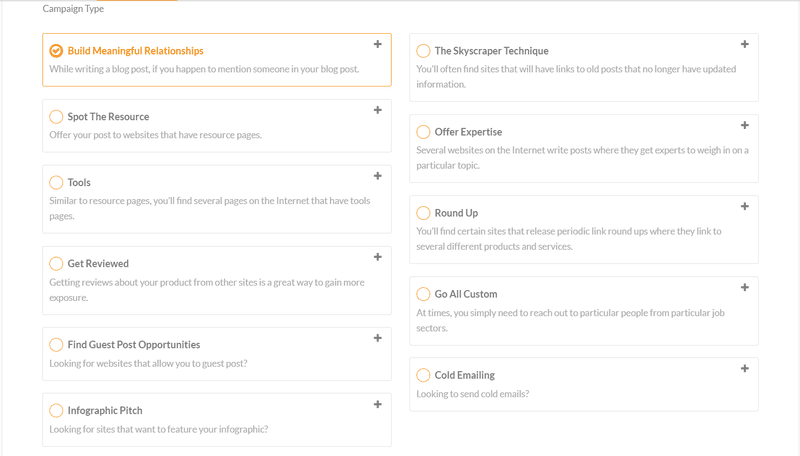
They even have an option for customized campaigns so that you can personalize your outreach as you want to.
BacklinkSEO’s prices start at $25 per month for 3 outreach campaign and their backlink monitoring and other services. Click here to learn more about their services.
Blogger outreach is not an exact science, but if you proceed with preparation, you may find it is easier than it seems.
We won’t lie- it is quite time-consuming and difficult, but all that hard work will pay off if blogger outreach is executed well.
To leave you with a final tip, allocate your site’s outreach responsibilities to a patient, and organized people-person!
Now, we would like to hear from you. Is there any successful strategy you know that we missed? Let us know!